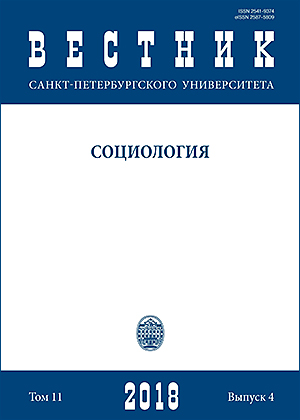Восприятие концепции «умного города» активными горожанами в Петербурге
DOI:
https://doi.org/10.21638/spbu12.2018.402Аннотация
В последнее время тематика развития «умных городов» приобретает большую актуальность во всем мире. Уже сейчас имеются примеры их эффективного строительства как в уже существующих агломерациях, так и полностью с нуля. Граждане в данной концепции выступают ключевыми стейкхолдерами. В Петербурге в 2017 г. началась реализация проекта «умного города». В статье представлены результаты пилотного эмпирического исследования, проведенного с целью изучения восприятия активными горожанами концепции «умного города» (smart city). Для достижения данной цели были изучены использование информационных технологий, способы реагирования на городские проблемы и ожидания от проекта «Умный Санкт-Петербург». Исследование проводилось методом онлайн-анкетирования, в опросе принял участие 421 респондент. Полученные данные позволяют судить о высоком уровне присутствия информационных технологий в повседневных практиках жителей города, выраженном в предпочтении использовать электронные каналы при взаимодействии с властью (94 %). Эффективность обращений через электронные порталы жители города оценивают в 57 %. Информированность о проекте «Умный город» высокая и достигает 74,6 % активных горожан. По мнению респондентов, строительство «умного города» следует начинать с включения граждан в процессы управления, а также с решения проблем благоустройства. Кроме того, приоритетным является внедрение «умных сервисов» для решения наиболее острых городских проблем: общественный транспорт, пробки, парковки, строительство. В целом отмечено преобладание среди опрошенных горожан позитивных настроений по отношению к будущему «Умного Санкт-Петербурга» (77 %).
Ключевые слова:
умный город, социальная адаптация, опрос, информационные технологии, активные горожане
Скачивания
Библиографические ссылки
References
Загрузки
Опубликован
Как цитировать
Выпуск
Раздел
Лицензия
Статьи журнала «Вестник Санкт-Петербургского университета. Социология» находятся в открытом доступе и распространяются в соответствии с условиями Лицензионного Договора с Санкт-Петербургским государственным университетом, который бесплатно предоставляет авторам неограниченное распространение и самостоятельное архивирование.




